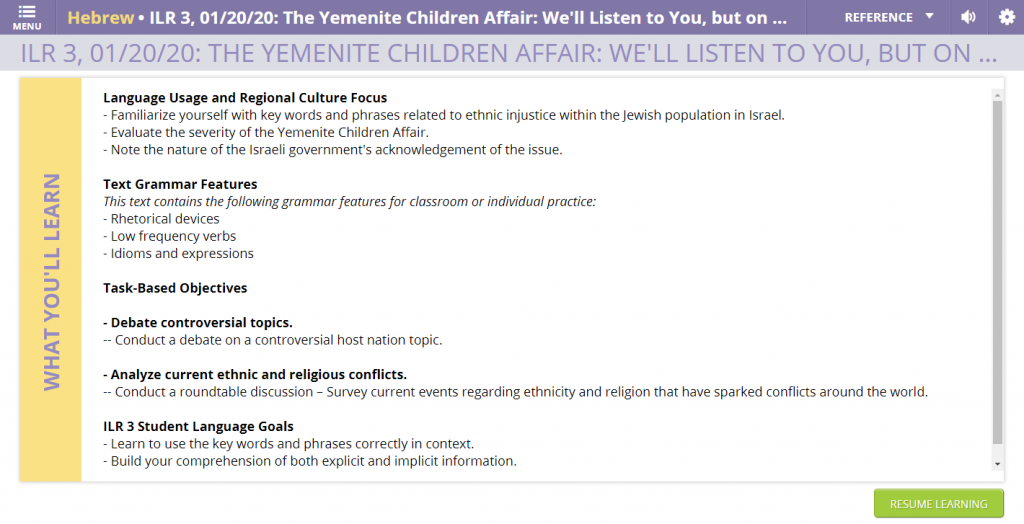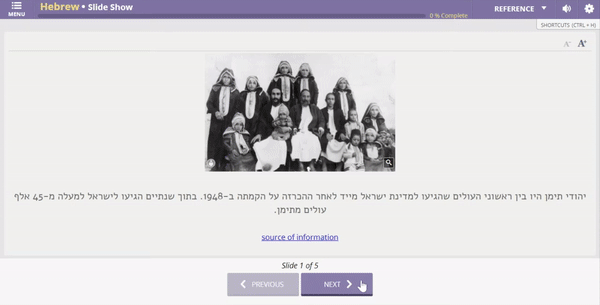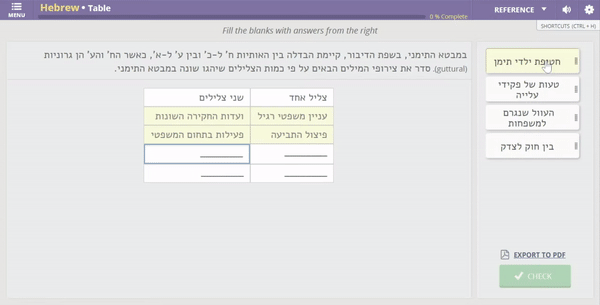Cohort Lesson of the Month – January 2020 Posted by meaghan on Jan 28, 2020 in Cohort Lesson of the Month, For Learners, For Program Managers
Last year, the CL-150 Cohort team published 2,409 new lessons, used by thousands of language professionals maintaining language proficiency on the job. We’re taking a look at one lesson each month to find out how Cohort lessons drive vocabulary, grammar, and regional and cultural expertise.
What are CL-150 Cohorts?
If you’re not familiar, CL-150 Cohorts are weekly lesson streams designed specifically for USG language professionals maintaining proficiency on the job. Each lesson provides a 2-hour “workout” at a specific ILR level, based on a professionally relevant, authentic source.
What is a CL-150 Cohort? from Transparent Language on Vimeo.
Cohort Lesson of the Month
This month’s featured Cohort lesson, The Yemenite Children Affair: We’ll Listen to You, but on Our Terms, comes from the Hebrew ILR 3 lesson stream.

Cultural and Historical Focus
The Yemenite Children Affair dates back to the 1950s, when thousands of Yemenite babies and toddlers were allegedly abducted by Israeli authorities and illegally adopted to Jewish families of European descent. The wounds from the affair are still felt now, 70 years later; Israel’s High Court of Justice ruled just a few weeks ago that a district court should consider a lawsuit against the state filed by Yemenite immigrant families who claim their children were stolen from them.
An op-ed about that lawsuit is the source for this Hebrew Cohort lesson. The lesson author, Talia, knows how important historical context is to understanding present day events and behavior:
“Since this is an advanced level lesson, I thought it was important to point out ethnic prejudice within the Jewish population in Israel, in this case between European Jews and Yemenite Jews. I think it adds to the learners’ historical and cultural knowledge, while exposing them to a well-known event in the host nation’s history.”

Language Focus
While the focus of the lesson text is on the Yemenite Children Affair, the lesson also introduces an important linguistic feature. Hebrew has a couple pairs of homophonous letters, but only Yemenite Jews differentiate between the letters in two of these pairs (het and khaf; alef and ‘ayin):
“The modern Hebrew accent is a ‘homogenized’, rather neutral accent. Only the Yemenite Jews preserve some of the original Hebrew accent, which is why I chose to present it in the lesson.”
To expose learners to this accent, Talia included extra resources and opportunities to practice. One of the slides in the Slide Show activity includes a link to a song by Zohar Argov (one of the most celebrated artists in oriental Jewish music) so learners can hear his Yemenite accent.
In Table, learners are prompted to point out words that would sound different in the Yemenite accent. The activity forces students to pay attention to detail and notice whether the phrase is affected by this marker in one versus two instances.

Hebrew sustainers, complete this month’s featured lesson and see how well you can detect the Yemenite accent.
Sustaining a different language? Explore our available Cohorts and stay tuned for next month’s featured lesson for more behind-the-scenes action from our Cohort Team.


